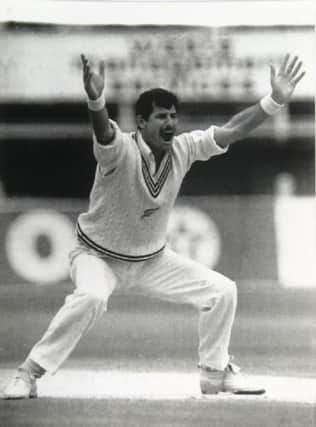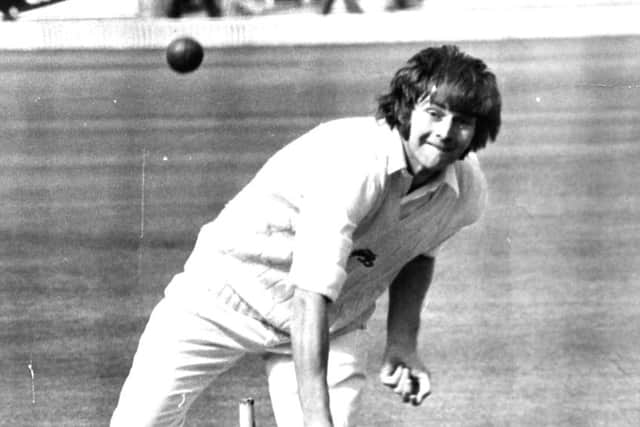Bygones: When Boycott led England as Kiwis celebrated historic Test win


It will be a tough challenge; just one point separates the combatants in the International Cricket Council world rankings, with New Zealand in fourth place and England in fifth.
When the teams line up at Eden Park, Auckland, for the first Test on Thursday, New Zealand will be seeking their 10th win over England in the 102nd Test between the nations.
Advertisement
Hide AdAdvertisement
Hide AdTheir first victory came 40 years ago this winter, when they beat a side captained by Geoffrey Boycott in a three-match series that ended 1-1.


To say that it was an historic result for a Kiwis’ team led by the comparatively unheralded Mark Burgess is an understatement.
It had been 48 years since the countries first met at Test level in 1930, and the opening Test of the 1977-78 series at Wellington was also their 48th Test meeting.
Burgess, a fair-haired top-order batsmen who led New Zealand just as they were starting to become an international force towards the end of the Seventies, presided over a result that Wisden Cricketers’ Almanack said “sent a thrill of achievement through the length and breadth of New Zealand, and was warmly received throughout the cricket world. Though England gained quick revenge (Boycott’s men won the second Test in Christchurch before drawing the final game in Auckland), it was an occasion to savour.”
Not that Boycott and company would have seen it that way.


Advertisement
Hide AdAdvertisement
Hide AdStraight from a testing tour of Pakistan, where an attritional series produced three bore draws, England found little succour against Burgess’s emerging side.
After Boycott inserted in windy Wellington, where gale-force conditions never relented, the hosts totalled 228, Yorkshire’s Chris Old capturing 6-54, before Boycott’s 77 – spread over seven hours and 22 minutes – helped England to 215.
The tourists should have won when Bob Willis’s 5-32 saw New Zealand dismissed for 123 second time, leaving just 137 for victory, but Richard Hadlee’s 6-26 (match figures 10-100) routed England for 64, still their lowest score against the Kiwis in Tests.
Although publicly gracious in defeat, Boycott left his players in little doubt as to what he thought of his team’s performance.
Advertisement
Hide AdAdvertisement
Hide Ad“It was not pleasant,” wrote Mike Gatting. “He accused everybody of playing like school kids.
“He did not shout but was brutally honest.”
For Boycott, whose Test captaincy career was confined to that winter, it was a sharp reminder of the vicissitudes of sport.
Just six months earlier, he had famously scored his 100th first-class hundred in the Headingley Ashes Test, resurrecting his international career that year in extraordinary fashion after a self-imposed exile.
Boycott scored 442 runs against Australia that summer at an average of 147.33, which lifted his overall Test average above 50.
Advertisement
Hide AdAdvertisement
Hide AdHis stock had surely never been higher, and he was rewarded with the vice-captaincy of the England team for the twin tours to Pakistan and New Zealand under the captaincy of Mike Brearley.
Like any schoolboy with cricket in his blood, Boycott had always dreamt of one day being England captain, and he got his wish in Pakistan when Brearley broke his arm in a meaningless tour game in Lahore.
Boycott took charge for the final Test in Karachi before leading the side throughout the trip to New Zealand, after which Brearley resumed command.
Considering that he had always cherished the captaincy, Boycott admitted that he actually got little pleasure from the job.
Advertisement
Hide AdAdvertisement
Hide Ad“That might be because I didn’t exactly shine on results,” he wrote in his autobiography, “but the real reason is that I got the job by default.”
Had Boycott been appointed captain outright, instead of just for those four Tests when Brearley was incapacitated, he would have had the chance to “mould my team and include my kind of players”.
Instead, Boycott openly conceded that the team he led “was not the one I would have taken on to the field had I been given any choice” as he delivered a candid assessment of his side’s inadequacies.
Boycott made clear: “Brian Rose, Graham Roope and Geoff Miller would not have been in it. Derek Randall would only have been there if his confidence had been high. Mike Gatting would have been discarded, then, as being too young and callow.”
Advertisement
Hide AdAdvertisement
Hide Ad“Barry Wood would have been in my side,” he added, “so would David Bairstow, Roger Tolchard, David Steele and Peter Willey – men with the necessary strength and character and fighting qualities.
“A captain must have players in whom he can have confidence. When the going gets tough, you can’t have men who are upset by plain speaking.”
Some were upset by Boycott’s forthright manner, which was not inclined to sugar-coat defeat.
There were also mutterings that he was too wound up in his own game to be a good captain, a charge that dogged him despite a cricketing knowledge that is second to none.
Advertisement
Hide AdAdvertisement
Hide AdIn the second Test in Christchurch, where England won by 174 runs on the back of a brilliant individual performance by Ian Botham, who scored a hundred and took eight wickets in the match, it was said that Botham deliberately ran out Boycott when quick runs were wanted in the second innings.
Legend has it that Bob Willis, the stand-in vice-captain, ordered Botham to “go and run the bugger out”, although Boycott dismissed this in his book as “a story that gets bigger and more fanciful with every telling”.
Perhaps matters might have turned out differently had New Zealand not thrown a spanner in the works in windy Wellington.
Arguably the most significant event of the match came from the very first ball, when Kiwis opener John Wright survived a strong appeal for a catch by wicketkeeper Bob Taylor off Willis.
Advertisement
Hide AdAdvertisement
Hide AdAs it was, debutant Wright, who went on to become one of New Zealand’s best batsmen, “settled into a groove of brave and skilled defiance which had an important bearing on the result”, wrote Wisden. “Nothing disturbed him. He waited 47 minutes for his first run, and ended the opening day of five hours forty minutes – there were two interruptions for rain and bad light – 55 not out.
“What New Zealand’s fate might have been but for Wright was not difficult to imagine.”
Although he was out next day without adding to his score, lbw to Botham, Wright “laid the foundation for his side’s victory”.
The great Hadlee did the rest, sealing a 72-run win that Wisden called “New Zealand’s finest hour” before an emotional crowd “gathered in front of the pavilion and sang ‘For they are jolly good fellows’, followed by three cheers.”